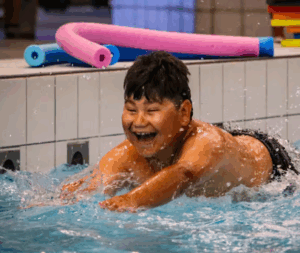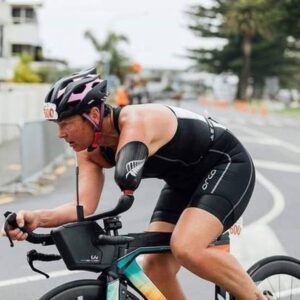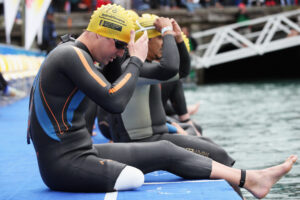Welcome to the Triathlon NZ Paratriathlon Pathway
Paratriathlon is for everyone — whether you’re curious about taking on your very first triathlon, looking for a supportive community to train with, or aiming to represent New Zealand on the world stage. This pathway is designed to guide you at every step, making it easy to find the information, resources, and support you need.
On this page, you’ll discover how to get started, connect with clubs and coaches, explore classification and competition opportunities, and see what it takes to progress towards international racing. Wherever your goals lie, Triathlon NZ is here to ensure you have the tools and encouragement to thrive in the sport.
Your journey begins here — from first swim-bike-run to chasing the silver fern on your suit.
The three levels in your para triathlon pathway

Community and Social
Inclusive clubs, fun/social triathlon, no classification needed, just give it a go!
Find a club
Find an event
Contact us for more info – info@triathlon.kiwi

Competition
National championship races, provisional classification required (see more below)
Para Sprint Distance National Champs
Contact us for more info – info@triathlon.kiwi

High Performance
International racing, international classification required (see more below)
Paralympics NZ
World Paratriathlon
Contact us for more info – info@triathlon.kiwi
Classification explained
To ensure fair and equal racing, all para-athletes racing at National Championship or International Events need to be classified. Classification helps group athletes based on how their impairment impacts swim, bike, and run performance, so that competition is balanced and meaningful. 
1. Provisional Classification – National Championship Competition
To race at national paratriathlon championship event in New Zealand (e.g. Para sprint Triathlon or Para-Duathlon Nationals), you’ll need a provisional classification. This provides an initial assessment of your eligibility and ensures fair participation at the domestic level. The form you will need to fill in before a Tri NZ classifier can assess you are available here. Note – forms are required to be submitted no later than 2 weeks prior to the event in which you intend to compete.
Physical Impairment – CLICK HERE
Vision Impairment – CLICK HERE
Once complete please email to info@triathlon.kiwi, we will then support you alongside a Triathlon classifier.
2. International Classification – International Competition
For athletes aiming to compete internationally, including World Championships and the Paralympic Games, an international classification is required. This formal process confirms eligibility for global competition and ensures consistency across all countries. International Classification occurs at World Triathlon events throughout the year, the events are available on the World Triathlon website HERE. If you have not already been in contact with Tri NZ then please make sure you email us at info@triathlon.kiwi so that we can support you through this process.
There are currently 12 sport classes for athletes with an impairment over the sprint para triathlon distance of 750m swim, 20km bike (hand bike/tandem), 5km run (racing wheelchair) at all World Triathlon sanctioned para triathlon events. A summary of these sport classes are given below:
Both PTWC1 and PTWC2 classes compete in the same PTWC Medal Event.
PTWC1 – Most impaired wheelchair users. Athletes must use a recumbent handcycle on the bike course and a racing wheelchair on the run segment; Includes athletes with comparable activity limitation and an impairment of, but not limited to: muscle power, limb deficiency, hypertonia, ataxia or athetosis.
PTWC2 – Least impaired wheelchair users. Athletes must use a recumbent handcycle on the bike course and a racing wheelchair on the run segment; Includes athletes with comparable activity limitation and an impairment of, but not limited to: muscle power, limb deficiency, hypertonia, ataxia or athetosis.
All the ambulant classes (PTS2-PTS5) compete in their own medal event.
PTS2 – Severe impairments. In both bike and run segments, amputee athletes may use approved prosthesis or other supportive devices. Includes athletes with comparable activity limitation and an impairment of, but not limited to, limb deficiency, hypertonia, ataxia and or athetosis, impaired muscle power or range of movement.
PTS3 – Significant impairments. In both bike and run segments, amputee athletes may use approved prosthesis or other supportive devices. Includes athletes with comparable activity limitation and an impairment of, but not limited to, limb deficiency, hypertonia, ataxia and or athetosis, impaired muscle power or range of movement.
PTS4 – Moderate impairments. In both bike and run segments, amputee athletes may use approved prosthesis or other supportive devices. Includes athletes with comparable activity limitation and an impairment of, but not limited to, limb deficiency, hypertonia, ataxia and or athetosis, impaired muscle power or range of movement.
PTS5 – Mild impairments. In both bike and run segments, amputee athletes may use approved prosthesis or other supportive devices. Includes athletes with comparable activity limitation and an impairment of, but not limited to, limb deficiency, hypertonia, ataxia and or athetosis, impaired muscle power or range of movement.
The three visually impaired classes (PTVI B1, B2 and B3) all compete in the PTVI medal event.
PTVI1 – Includes athletes who are totally blind, from no light perception in either eye, to some light perception. One guide is mandatory throughout the race. Must ride a tandem during the bike segment. A guide from the same nationality and gender is mandatory throughout the race. Must ride a tandem during the bike segment.
PTVI2 – Includes athletes who are more severe partially sighted athletes. One guide is mandatory throughout the race. Must ride a tandem during the bike segment. A guide from the same nationality and gender is mandatory throughout the race. Must ride a tandem during the bike segment.
PTVI3 – Includes athletes who are less severe partially sighted athletes. One guide is mandatory throughout the race. Must ride a tandem during the bike segment. A guide from the same nationality and gender is mandatory throughout the race. Must ride a tandem during the bike segment.
The People and Places to Help You Thrive
Para triathlon is more than just an individual sport — it’s a community. Along your journey, there are many people ready to support you, from local clubs that provide a welcoming environment, to coaches who understand your goals, and events that give you the chance to challenge yourself and connect with others.
On our website, you can easily find the right support to suit your needs. Our Club page highlights inclusive triathlon clubs across the country, many with para-specific opportunities ((look for the para logo). The Coach page allows you to search for experienced coaches who are passionate about helping para athletes achieve their best (look for their para badge). And our Events Calendar makes it simple to discover upcoming races and training opportunities designed to be accessible and supportive (search on para).
Whether you’re just starting out or aiming for the next level, there’s a whole community ready to back you.